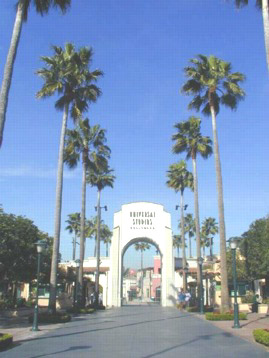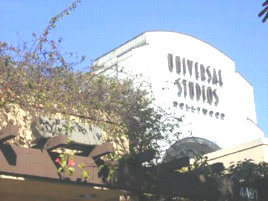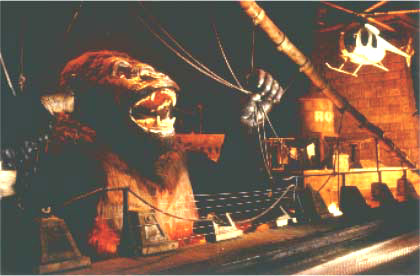 You suddenly hear multiple sirens around the next corner as emergency vehicles race to a yet unseen calamity. A rapid pulsation in the air signals nearby helicopters, getting closer, possibly ready to fly directly overhead. The ground begins to tremble under the feet of fleeing citizens. Even deeper, resonating ground tremors shatter windows, crack concrete, and cause the elevated train platform to shriek as straining metal supports sway, expand, and contract under the stress of the moving Earth.
You suddenly hear multiple sirens around the next corner as emergency vehicles race to a yet unseen calamity. A rapid pulsation in the air signals nearby helicopters, getting closer, possibly ready to fly directly overhead. The ground begins to tremble under the feet of fleeing citizens. Even deeper, resonating ground tremors shatter windows, crack concrete, and cause the elevated train platform to shriek as straining metal supports sway, expand, and contract under the stress of the moving Earth.
As you pass an apartment building your attention is drawn to an open window and the glow of a television. The volume is set very loud and you listen to a frantic news woman reporting from a hovering news helicopter, apparently, over the site of the turmoil. She warns to, “Stay away, it’s loose… danger…!” In an instant the televised image becomes muddled as the cameras and people in the helicopter are tossed about and the sounds of screams, mixed with twisting metal, pierce the night. The aircraft’s engine, which is clearly heard from the television, as well as from the now overhead helicopter itself, labors against an opposing force, then loses power. All hell breaks loose above the elevated train platform and then you see the news helicopter steak toward the ground, smoke trailing out of its engine compartment. Becoming mercilessly tangled in overhead cables, the speed and weight of the falling craft pulls down several power poles. Sparks from snapping high-tension cables instantly ignites leaking fuel and the helicopter erupts into a ball of flames as it impacts the street, a mere few yards from your vantage point. A car veers to avoid the flaming wreckage, only to lose control and crash into an apartment building, not before taking out a fire hydrant or two.
The sounds of chaos, behind, above, and all around you, become overwhelming. When you turn, you see several cars from the elevated train now lay in twisted heaps on the street, fallen – possibly thrown – from the elevated platform. Smoke emanates from out-of-control fires, fed by ruptured gas lines, as high-pressure steam and water blasts out of innumerable and unseen broken pipes. Your mind races, “Got to get to the Brooklyn Bridge, must get off of Manhattan Island,” as you make your way to perceived safety through a massive cloud of blinding steam and smoke.
Just before you think it could get any worse, it does. The impact of repeated gas-fed explosions hits you in your chest. Gun fire, screaming citizens, and an amplified voice of authority warn of increasing danger. Rapid fire machine gun reports are heard before the muzzle flare is seen through the murkiness of the dissipating steam cloud. The choking heat of the steam in your lungs is quickly blown away by the propeller draft of a low-flying police helicopter. As you regain your vision, you find you have somehow made it onto the Brooklyn Bridge. Before gasping your first breath of cool air, the bridge underneath you shudders, and then the suspended roadway swings wildly. As your eyes focus you find yourself looking directly into the face of the largest ape you have ever seen. King Kong is pulling on the suspension cables of the bridge, jeopardizing not only the structure, but also your only route to safety. The police helicopter’s machine gun fires point blank at the enraged beast. If the bridge structure holds, maybe, just maybe, you can get to the other side before the giant gorilla crushes you or you’re hit by a stray, or ricocheting, bullet. A loud, clear, calm voice breaks through the pandemonium, “Please keep your arms and legs in the tram as it pulls out of the attraction.” Large barn-like doors swing open and you’re back into the daylight as you turn onto Main Street, USA, on the back lot of Universal Studios Hollywood.
The King Kong attraction at Universal Studios Hollywood, installed in 1986, is one of the great, classic attractions in themed entertainment. Not since Jurassic Park went online in June of 1996, has any one attraction become so synonymous with Hollywood, California and Universal Studios. The huge ‘drive-through’ attraction is hidden away in a massive building on the back lot of Universal Studios Hollywood. If the tram didn’t take you through it, you would never know it was there behind all the movie sets and street facades that have played backdrop to countless movies and television programs. The massive diorama of New York City takes up over 45,000 square feet of indoor floor space under 50-plus foot ceilings. The attraction is exacting in its detail, complete with an elevated railway and mangled train, multistory buildings, illuminated city skyline, “flying,” as well as crashing and burning helicopters, gushing fire hydrants, live steam, 30 foot tall natural gas-fed flames, as well as the monstrous, animatronics King Kong himself, pounding a scale Brooklyn Bridge, complete with hydraulically-driven ‘structural failures’. (As one would imagine, the attraction is even replete with New York City-esque graffiti). The gist of the attraction is you, and everyone else on the tram, find yourselves unwilling spectators to Kong’s tirade through New York City. (I believe the story goes, Kong moves to New York City for a girl and a paying club gig, she dumps him as soon as he gets there, the gig involves too many chains and restraints, he finds out he’s getting stiffed on his box-office receipts, he storms off-stage, etc., etc., etc.)
When the King Kong attraction is static, the temperature in the room remains pretty cold, hovering close to the low 60 degree mark in the summer, and significantly lower in the winter months. During evening maintenance hours, workers are usually wearing heavy jackets or long underwear when servicing the attraction.
The King Kong attraction is only 150 seconds in duration, but in that time period, the room atmosphere and climate goes through very drastic changes, providing an additional aspect of realism to the overall show. When the tram enters the attraction and triggers the system to start, multiple plumbs of water and fire shoot up to 30 feet into the air, and boiler-generated steam turns the cold and dry air into a hot and humid atmosphere in 30 to 45 seconds. At the height of the tourist season, the King Kong attraction can be operational 24 times per hour, with as many as 77,000 visitors passing through it in a single day. During the busy holiday and vacation seasons, one tram is exiting the attraction as another is entering.
Harald Emmert, Sound & Video Foreman, points out, “It’s a loud attraction. The designers were very successful in recreating New York City, which is a loud city to begin with, but on top of that they needed to make it sound like it was being torn apart and destroyed by King Kong.” The original sound system consisted of over 40 distributed, mostly bi-amped, loudspeakers and the attraction – at peak operating performance – has an SPL output of 120 dB. The loudspeakers were either flown from the ceiling, positioned around King Kong and the Brooklyn Bridge, or concealed in other elements and building facades.
The King Kong attraction is also a very hostile environment, especially for loudspeakers. Over a period of eleven years, the original sound system hung in the Kong attraction, but not without audio technicians replacing a multitude of 12″ and 15″ cones every six months. “Speaker cone material would simply deteriorate from the conditions,” states Harald, with other AV department technicians concurring. Continuing, Harald points out, “Loudspeakers used for the pyrotechnic and water sound effects were always in close proximity to these effects to create the illusion the fire or water was actually emanating the sound. These were always the loudspeakers that required the most maintenance.”
Harald continues, “We can measure a temperature shift of 20 to 25 degrees or more from when the attraction starts its cycle to when it finishes. The temperature variations at the ceiling level, where approximately a third of the loudspeaker system is installed, are significantly greater than at street level. Temperature shifts of 30 to 35 degrees are not uncommon, even with all the automatic exhaust and venting fans on full blast. But, aside from temperature and atmospheric changes, there is a tremendous amount of dirt and dust in the form of exhaust generated by the gas burners and 15 to 24 diesel-powered trams per hour.” All of the signal processing is hidden away in a sealed, secure, temperature-controlled room, free of drastic temperature changes, dirt, dust and other forms of ‘attraction exhaust’.
Ed Carri, Line Supervisor for the Audio and Video Technology Department, previously held Harald’s position of Sound & Video Foreman, and as a 20 year Universal AV Department veteran as of May 1999, has “seen-it-all.” He and then-Manager of Sound & Video, Jim Schmidt, specified a new Technomad sound system into the King Kong attraction after they found success with the Technomad loudspeakers on Scene 12 of the Jurassic Park attraction. Scene 12 is the climacteric indoor section of America’s largest water-ride, featuring the world-renowned 20 foot tall, animatronics Tyrannosaurus Rex. Ed states, “The mist, moisture, and humidity generated by Scene 12’s three story-tall, 5,000 gallon-per-minute-waterfall, from where T-Rex emerges, is overwhelming. The former sound system could not withstand this environment, and we were left no alternative but to replace it after it succumbed to the elements, for the fifth time, after only four months of operation.”
 Aside from the elements, Scene 12’s background noise from the waterfall, the noise of the boat on the tracks, and the chain-pull mechanism, registers a consistent 100 dB. In October 1996, the original mid/high cabinets were replaced with one pair of evaluation Technomad Berlin loudspeakers, left and right of T-Rex. The results were immediately evident, with the T-Rex roaring sound effect pinning the SPL meter a level of 110 dB, 60 feet from the source. “We were sold,” states Jim.
Aside from the elements, Scene 12’s background noise from the waterfall, the noise of the boat on the tracks, and the chain-pull mechanism, registers a consistent 100 dB. In October 1996, the original mid/high cabinets were replaced with one pair of evaluation Technomad Berlin loudspeakers, left and right of T-Rex. The results were immediately evident, with the T-Rex roaring sound effect pinning the SPL meter a level of 110 dB, 60 feet from the source. “We were sold,” states Jim.
In November 1996, Los Angeles-based Direction Sound/Vision assisted in replacing the Scene 12 sound system with a Crown-powered Technomad sound system, consisting of eight Berlin 15/H two-way loudspeakers and eight Chicago 15/12 subwoofers. The Technomad Chicago subs, powered by two MarcroTech 5000s, are distributed on the platforms, four subs on each side of the boat track, to deliver T-Rex’s ominous, ‘approaching’ footstep sound effects. Eight Technomad Berlin 15/H loudspeakers, powered by Crown Power-Tech 1 and 3 amplifiers, deliver the blood-curdling roar of T-Rex as the beast lunges at the spectators in the final moments of the ride. Two Berlin loudspeakers are installed approximately 25 feet above the boat track and fire directly down on the spectators. Four additional Berlins are, again, positioned within 25 feet of the spectators, left and right of the boat track, two loudspeakers per side, parallel to and in back of the overhead Berlin loudspeakers. The original two Berlins remained suspended two feet in front of the waterfall, positioned left and right of T-Rex, approximately 35 feet above the floor, and approximately 60 feet from the spectators.
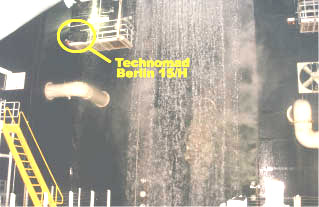 The eight Berlins targeted onto the area where the boat pauses during the T-Rex attack are set to “put 115 to 118 dB on the boat.” Due to a planned waterfall modification four weeks after the two ‘eval-Berlins’ were installed, a newly routed chute began to deliver a daily deluge of water directly onto the two cabinets. “That was the ultimate proving test and they are still working to this day,” states Jim.
The eight Berlins targeted onto the area where the boat pauses during the T-Rex attack are set to “put 115 to 118 dB on the boat.” Due to a planned waterfall modification four weeks after the two ‘eval-Berlins’ were installed, a newly routed chute began to deliver a daily deluge of water directly onto the two cabinets. “That was the ultimate proving test and they are still working to this day,” states Jim.
It wasn’t long after Jurassic Park’s Scene 12 was up and running smoothly that King Kong started to develop a case of laryngitis. Expenses in maintaining the sensitive King Kong sound system had always run considerably above-the-norm. But, when almost 45% of the loudspeakers all seemed to fail within a 60 day period, the executive directive came down to either repair the ailing decade-old Kong system or replace it. Ed states, “Before the theme park undertakes an attraction sound system overhaul of this magnitude, I have to submit several options on how to get it back up to specs. It comes down to, ‘How much for a full replacement system?’, compared to, ‘How much to repair it?’ With both options, you have to deal with replacement component costs, plus attraction down-time, and manpower requirements to complete each scenario, and then it finally comes down to, ‘What’s going to last?'”
Jim Byron, president of Direction Sound/Vision, was again called on to assist in offering up some options on getting King Kong in full voice again. The first alternative was to repair the existing sound system. Jim states, “When I first contacted the manufacturer, I was told the speaker models were so far out of production, they had never heard of the model numbers before. It took them over a week to research the models and get back to me with the news the components were no longer available. I was advised that similar, newer components could be changed out in the cabinets, but based upon specs, the end result would have not met the criteria for the attraction.”
Ed notes, “The difference between replacing 90% of the King Kong sound system with brand new loudspeakers and additional signal chain equipment, compared to repairing the existing system with inferior components, only amounted to about $1,800.00.” Ed continues, “Jim Schmidt and I were already sold on the Technomads after eight months of flawless performance in the drenching conditions of Jurassic Park. It was a dollars and sense agreement at the executive level to upgrade the King Kong sound system with new Technomad loudspeakers, since they were very pleased with the way Jurassic Park’s Scene 12 was sounding and performing.”
Twenty-nine Technomad WeatherTech Berlin 15/H two-way loudspeakers replaced all of the aging bi-amped loudspeakers. Seven Chicago Technomad WeatherTech 15/12 subwoofers replaced the “no-one-knows-how-old” ‘sensurround’ subwoofers that provided the low-end ‘Brooklyn Bridge’ rumbling effects as King Kong shakes the bridge in the final moments of the attraction. Three Technomad WeatherTech Noho/C loudspeakers provide ‘screeching’ effects on the elevated train and gunfire sound effects on the hovering police helicopter.
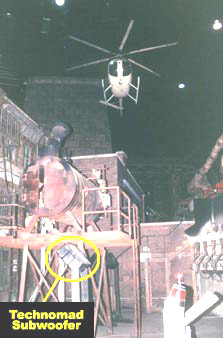 The ‘ground-level’ Brooklyn Bridge Berlins and Chicagos were installed out of sight of the visitors, on six foot-tall, adjustable stanchions, to direct their output at the visitors on the tram. The ‘exploding furnace’ erupts in flames, as four gas jets (right), positioned next to the Brooklyn Bridge, blast flames into the air during the final moments of the attraction. To create a louder, more dynamic explosion and burning sound effect, one Berlin loudspeaker and one Chicago sub is placed in close proximity to these fire effects. Note the Berlin (foreground, below the boiler) and Chicago, (behind the boiler support structure), are both positioned within six feet from where the flames erupt out of the boiler, (noted by the blackened areas on the boiler). Another Berlin and Chicago are positioned, again on stanchions, on the upper ledge (back right), to the left of the four gas jets. A cabinet from the original sound system sits idle, to the immediate left of the four gas jets, waiting to be removed and scrapped. One flown Berlin loudspeaker is visible in the darkness, at 11 o’clock of the helicopter’s propeller blade. Seven of the twenty-nine Berlin Loudspeakers installed in the Kong attraction are positioned in the windows of the apartment building facades, concealed by curtains and window dressings. These two Berlins fire at the Brooklyn Bridge providing sound effects consisting of explosions, panicked citizens, sirens, and ‘bridge rumblings’.
The ‘ground-level’ Brooklyn Bridge Berlins and Chicagos were installed out of sight of the visitors, on six foot-tall, adjustable stanchions, to direct their output at the visitors on the tram. The ‘exploding furnace’ erupts in flames, as four gas jets (right), positioned next to the Brooklyn Bridge, blast flames into the air during the final moments of the attraction. To create a louder, more dynamic explosion and burning sound effect, one Berlin loudspeaker and one Chicago sub is placed in close proximity to these fire effects. Note the Berlin (foreground, below the boiler) and Chicago, (behind the boiler support structure), are both positioned within six feet from where the flames erupt out of the boiler, (noted by the blackened areas on the boiler). Another Berlin and Chicago are positioned, again on stanchions, on the upper ledge (back right), to the left of the four gas jets. A cabinet from the original sound system sits idle, to the immediate left of the four gas jets, waiting to be removed and scrapped. One flown Berlin loudspeaker is visible in the darkness, at 11 o’clock of the helicopter’s propeller blade. Seven of the twenty-nine Berlin Loudspeakers installed in the Kong attraction are positioned in the windows of the apartment building facades, concealed by curtains and window dressings. These two Berlins fire at the Brooklyn Bridge providing sound effects consisting of explosions, panicked citizens, sirens, and ‘bridge rumblings’.
King Kong’s “growl components” consist of one Berlin 15/H, one Chicago 15/12 subwoofer, one Electro-Voice MTH 2/64, and two ElectroVoice MTL2s. Kong’s EV loudspeakers are powered by one Crown MicroTech 600, 2400, and 3600 amps. Harald points out, “The EV loudspeakers were installed about two years ago to augment the existing loudspeaker system. The EV loudspeakers are almost underneath Kong and the mechanism that supports him. They are partially protected from the attraction elements since they are installed underneath the bridge and, at this point in time, they are hanging in there.”
The third Noho was installed in King Kong’s chest to “augment his vocalizations.” Over the course of time, the original speaker that was installed in Kong’s chest was regularly shaken to the point of failure from his movements. Kong is a very large animatronics machine and his movements are quite extreme. Harald states, “We found the Noho to be a very powerful, compact, durable speaker that fit perfectly and could hold together in this extremely ‘mobile’ application. The EV system puts out some really nice SPL levels, but if Kong’s voice is not emanating from King Kong himself, the impact of the attraction’s climax is anticlimactic. The Noho does a good job of cutting through, so it sounds as if Kong is screaming in everyone’s face.”
Six Pioneer LV-D 6000 laser disk players feed the attraction’s entire video and audio program material through six, newly acquired, dBx 2231 EQ’s, and the remaining signal processing gear that consists of one dBx 12x-DS Sub Harmonic Synthesizer, one Urie JBL 5547A EQ, two Urie JBL 5549 EQs, three Urie JBL 5234A crossovers, three IED 5000 VCAs, one Ramsa WS-SP2A Sub Processor, and one Aphex 120 DA.
Most of the Technomad Berlins and all of the Noho/C loudspeakers are driven by the existing BGW 250D amplifiers. “I’m very impressed with the efficiency of the Berlin and Noho loudspeakers,” states Harald. “The majority of the 400 watt, 8 ohm Berlins are seeing as little as 125 Watts into 8 Ohms from the BGW 250Ds, and they are putting out a lot of sound. The 275 watt, 8 ohm Noho is powered with 350 Watts into 8 Ohms from a bridged mono BGW 250D per-speaker, and states Harald, “there is a lot of sound from such a small loudspeaker.” A combination of Berlin loudspeakers and Chicago subwoofers are powered by thirteen BGW 750D amplifiers. Berlins used for articulation-critical, spoken word program material are driven with 250 Watts at 8 Ohms. Seven of the fan-cooled, bridged mono BGW 750Ds pump 1200 Watts into each of the seven 700 watt, 4 ohm Chicago subs. Harald points out, “When we pulled out all of the old bi-amped cabinets, we suddenly found ourselves with a lot of additional amp channels. We’re getting significantly better articulation and detail in the system, with far less power.”
Ed Carri sums up the reliability of the BGW amplifiers with one word; “Excellent.” Expanding on the subject, Ed states, “The late 70s-era BGWs that were installed in the King Kong attraction are all original from when the attraction went online in 1986, and I don’t remember ever experiencing a failure with any of those amps. BGW amps were installed in a very big way through out Universal Studios Hollywood in the 1980s, and many if not all of them are still in service. They are incredible workhorses that just keep getting moved from attraction-to-attraction.”
Robert Dugger replaced Jim Schmidt in early 1998, becoming Manager of Technical Response, when Jim was promoted to Manager of Attraction Engineering. At the same time Harald Emmert was promoted to Sound & Video Foreman when Ed Carri was promoted to Line Supervisor for the Audio and Video Technology Department. The entire Technomad system was installed by the Universal Audio Visual staff, under Ed Carri’s direction, and it was Harald who supervised the rewiring of the entire Kong system. Robert was responsible for final tuning and adjustments to the system, which only took two evenings. Robert points out, “Coming into a new position, you’re always concerned about what the outgoing staff is leaving you, especially if you’re not familiar with the products. Since making final adjustments on the Kong attraction we’re back up to its original SPL specs, and the system remains incredibly stable. We only make finite adjustments to various zones if we get a notice from a tram driver, tour guide, or visitor that a specific zone might be too loud or too low. Those adjustments have been few and far between.”
Robert and Harald agree, if something works, you stick with it. “As loudspeakers in critical outdoor or caustic environments continually die, we replace them with Technomads,” states Robert. Harald concludes, “So far, there are no natural or manmade elements that can stop the Technomads… that we can find. It’s surreal to see the Technomad loudspeakers in waterfalls, continually getting blasted with steam, or in such close proximity to massive, open flames. As an audio professional, seeing a speaker, especially, in a waterfall just goes against what you know loudspeakers can and cannot do. The amazing thing is, the Technomads do it all and more. No matter what we throw at these things, they just keep working.”
—–
Primary King Kong system: 6 Pioneer LV-D 6000 laser disk players 6dBx 2231 EQ’s 1dBx 12x-DS Sub harmonic Synthesizer 1 Urie JBL 5547A EQ’s 2 Urie JBL 5549 EQ 3 Urie JBL 5234A crossovers 3 IED 5000 VCA’s 1 Ramsa WS-SP2A Sub processor 1 Aphex 120 DA 16 BGW 250D Amplifier 13 BGW 750D Amplifier 29 Technomad WeatherTech Berlin 15/H two-way Install Version Loudspeakers 7 Technomad WeatherTech Chicago 15/12 Install Version Subwoofers 3 Technomad WeatherTech Noho/C two-way coaxial Install Version Loudspeakers
King Kong ‘Growl’ components:
1 EV MTH 2/64 2 EV MTL 2 1 Deltamax controller 1 EV Crossover 1 Crown Microtech 600 Amplifier 1 Crown Microtech 2400 Amplifier 1 Crown Microtech 3600 Amplifier
 When asked if he has finally tamed his T-Rex, Jim Schmidt, Manager of Sound & Video for Universal Studios Hollywood, comments, “No way. That was never our intention. We wanted to make him more threatening, ornery and angry sounding, so we could leave a lasting, terrifying impression on everyone who sees and hears him.” Laughing, Mr. Schmidt notes, “I want everyone who visits Jurassic Park to have nightmares about T-Rex after they leave here, and we absolutely accomplished that task.” The Tyrannosaurus Rex Mr. Schmidt refers to is affectionately known as ‘T-2’ by the technical staff of Universal Studios Hollywood. T-2 is the 6 meter tall, animatronics menace who resides in the climacteric indoor section of the newly opened Jurassic Park attraction.
When asked if he has finally tamed his T-Rex, Jim Schmidt, Manager of Sound & Video for Universal Studios Hollywood, comments, “No way. That was never our intention. We wanted to make him more threatening, ornery and angry sounding, so we could leave a lasting, terrifying impression on everyone who sees and hears him.” Laughing, Mr. Schmidt notes, “I want everyone who visits Jurassic Park to have nightmares about T-Rex after they leave here, and we absolutely accomplished that task.” The Tyrannosaurus Rex Mr. Schmidt refers to is affectionately known as ‘T-2’ by the technical staff of Universal Studios Hollywood. T-2 is the 6 meter tall, animatronics menace who resides in the climacteric indoor section of the newly opened Jurassic Park attraction.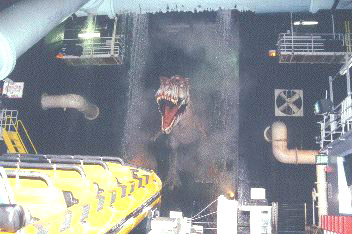 When the entire system and waterfall is on, dew point in this section of the attraction is 100% for as long as 16 hours per day, everyday of the year, except Thanksgiving and Christmas – the only two days of the year the park is closed. Aside from the waterfall, a substantial amount of water mist and vapor is vented into the atmosphere from ‘broken pipes and valves’, to create a greater impression of damage caused by the T-Rex. Mr. Schmidt states, rather factually, “It’s not the healthiest place for loudspeakers. The mist, moisture and humidity in this part of the Jurassic Park attraction is overwhelming. The former sound system could not withstand this environment, and we were left no alternative but to replace it after only four months of service. It was vital we find a powerful sound system that could survive in this room.”
When the entire system and waterfall is on, dew point in this section of the attraction is 100% for as long as 16 hours per day, everyday of the year, except Thanksgiving and Christmas – the only two days of the year the park is closed. Aside from the waterfall, a substantial amount of water mist and vapor is vented into the atmosphere from ‘broken pipes and valves’, to create a greater impression of damage caused by the T-Rex. Mr. Schmidt states, rather factually, “It’s not the healthiest place for loudspeakers. The mist, moisture and humidity in this part of the Jurassic Park attraction is overwhelming. The former sound system could not withstand this environment, and we were left no alternative but to replace it after only four months of service. It was vital we find a powerful sound system that could survive in this room.” For an initial quick-fix, “and evaluation purposes,” stated Mr. Carri, two Technomad full-range Berlin model loudspeakers were ordered prior to tearing out T-2’s original sound system. Originally, the left Berlin speaker was hung in the waterfall. A huge cascade of water was pouring over this cabinet every day until it was repositioned two weeks later. The Berlins are now suspended in the huge mist cloud, only one meter in front of the huge, three story tall waterfall that recirculates hundreds of thousands of liters of water around Tyrannosaurus Rex, every day. Each speaker is approximately 8 meters above the floor, and approximately 18.5 meters from the spectators. When the two Berlins were powered up, they immediately penetrated the overwhelming background noise and projected the ‘T-Rex roaring’ sound effect at a level of 110 dB, 18.5 meters from the source.
For an initial quick-fix, “and evaluation purposes,” stated Mr. Carri, two Technomad full-range Berlin model loudspeakers were ordered prior to tearing out T-2’s original sound system. Originally, the left Berlin speaker was hung in the waterfall. A huge cascade of water was pouring over this cabinet every day until it was repositioned two weeks later. The Berlins are now suspended in the huge mist cloud, only one meter in front of the huge, three story tall waterfall that recirculates hundreds of thousands of liters of water around Tyrannosaurus Rex, every day. Each speaker is approximately 8 meters above the floor, and approximately 18.5 meters from the spectators. When the two Berlins were powered up, they immediately penetrated the overwhelming background noise and projected the ‘T-Rex roaring’ sound effect at a level of 110 dB, 18.5 meters from the source.
